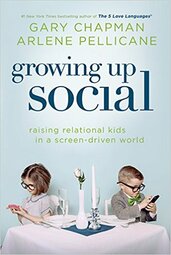Being a parent is hard.
So, too, is navigating technology and screen time with young children.
For this reason, I was excited to read Gary Chapman and Arlene Pellicane's Growing Up Social: Raising Relational Kids in a Screen-Driven World.

The first half of this book explores five A+ skills (“strong moral character traits that will predict your child's success as he or she grows into an adult”) including affection, appreciation, anger management, apologies, and attention. Using various research studies, the authors wrestle with the implications of screen time on each of these traits. I found this half of the book immensely helpful and challenging, frequently reading and discussing chapters with my husband in order to wrestle with its implications for our family.
Among other things, in the first half of the book, I appreciated the age-specific developmental markers designed to help parents realize what their children can reasonably be expected to do. For example, in the chapter on appreciation, readers are reminded, “By age two or three, children can talk about being thankful for specific objects, people, pets, and experiences.”
I also loved the various spreads in Growing Up Social designed to help make different concepts extremely practical at a glance. For example, I'll be referring to the 10 screen-free ways to cultivate a thankful heart in your child often!
The second-half of Growing Up Social features several chapters about the impact of screen time on various things, including shyness and the brain. It then investigates very practical facets of navigating screen time, including security, parental authority, the single parent, and you.
Within this section of Growing Up Social, I particularly enjoyed the chapter on screen time and the brain. In it, the authors remind readers that doctors currently say, “Our leading hypothesis is the 'use it or lose it' principle. If a teen is doing music or sports or academics, those are the cells and connections that will be hardwired. If they're lying on the couch or playing video games or watching MTV, those are the cells and connections that are going to survive [in the brain].”
While I still enjoyed the second-half of Growing Up Social, it felt less research-based than the first half. As a result, I found it less helpful than the first-half of the book.
Overall, though, I really appreciated how Growing Up Social is designed to serve as a map, rather than a rulebook, for navigating screens with children. Rather than giving hard and fast do's and don't's, this book instead raises questions for families to answer and, in the process, figure out what works for them. For example, Gary and Arlene challenge families to consider
What factual data is my child learning from this program?
What kind of character traits is this program seeking to build in my child?
How does this program treat family members?
Is this program consistent with our family values?
Is technology bringing your family closer together, or is it driving your family farther apart?
Growing Up Social is a book that's challenged me to consider how I use technology and how that might impact my young daughter and our family. It's a resource that is timely and relevant. I highly recommend it to parents, regardless of how old your children are.
**************************************************
Disclosure: I received a free copy of Growing Up Social: Raising Relational Kids in a Screen-Driven World in exchange for a fair and honest review.
Tags
Latest Posts
- The Message of Ash Wednesday
- Jesus chooses you and so does the church
- Teaching kids to worship
- This is 44
- The gift of VBS
- 7 Reasons Why Group May Not Be the Easy VBS
- 4 Things I Appreciated About Group’s SCUBA VBS
- Honey, I love you
- 12 Books You Should Read
- A blessing for youth leaders nurturing faith beyond youth group